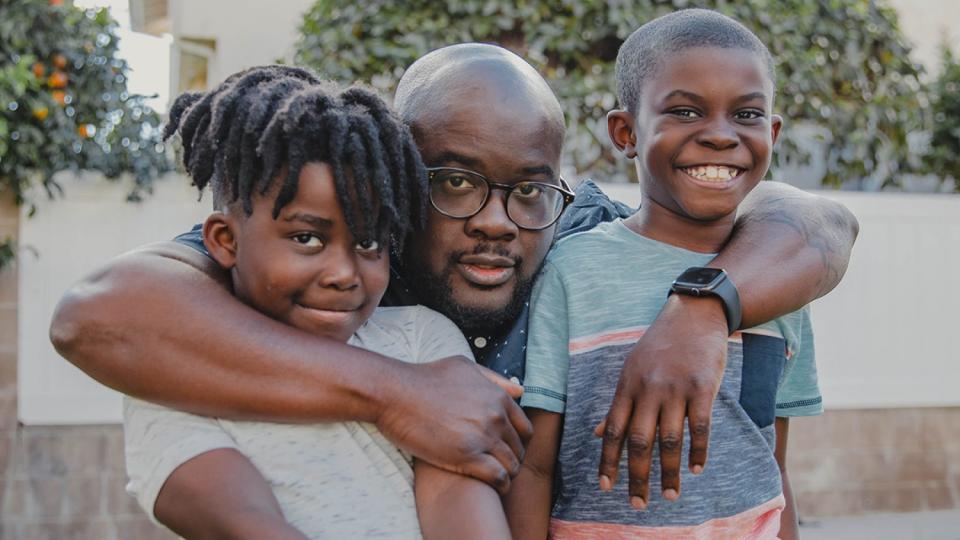Why teaching your kids about racism is important

Glen Henry is an In The Know by Yahoo parenting contributor. Check out his site, Beleaf in Fatherhood, and follow him on TikTok and Instagram for more.
When I became a father for the first time, I admittedly didn’t know much. I knew it was my job to keep my son alive, and I knew I wanted to be the kind of parent who prepared him for the world in a way that I wasn’t.
Traveling home for the holidays? Here are 4 things you need to do right now.
The thing is, the world will reveal itself to our children whether we like it or not. That’s why I have always made it a point to have difficult conversations with my children, both honestly and early, so that I can teach them about the hard stuff before someone else does.
After George Floyd was murdered in 2020, my wife and I made the difficult decision to sit our children down and talk to them about racism. It wasn’t difficult because I didn’t want to do it; it was difficult because I had to. At the intersection of my own pain and the pain of our community was a need to not only prepare my children for the inevitable ways of the world around them, but also to protect them from the sting of ignorance.
This simple pastry dish will be your go-to all holiday season:
We as a couple decided to share the conversation we had with each of our oldest sons because we thought it might help other parents in their own difficult conversations. We were met with a lot of backlash, with some saying we were destroying our children’s innocence, while others said we were turning them into underdogs or instilling hate in them that wasn’t there before.
We tell our children the truth

Let me be explicitly clear in saying that we have never told our children that an entire community of people or professionals was “bad.” We have never tried to insinuate to them that all white people or all cops were to blame for the tragedies that have plagued the Black community. We’ve never told them that the color of their skin is something that makes them weaker or vulnerable. Why? Because we tell our children the truth.
The truth is that some people, for whatever rhyme or reason, have prejudice against Black people and a hate in their hearts that doesn’t make sense to those of us who don’t carry it. It is dark and evil, but, unfortunately, it is real. It’s real, and it’s not something for my children to be ashamed of because it’s not their burden to bear. Unfortunately, others will try to make them bear it, which is why we had this difficult conversation.
Creating a safe space
One year later, my children went to the park they usually go to with their nanny. They were playing with another group of children when one poorly informed child told them that “Black people are bad.”
My children knew what to do. They knew how to handle it. They knew the child was wrong. They knew there was no truth behind these words because their parents, the people they trust the most, had told them so.
They also knew not to take it to heart, and they were able to shake it off because this wasn’t a new and foreign idea to them. They had been prepared for this moment, and the ignorance of their peers didn’t pierce as deeply as it would have if they had gone into the situation completely unaware that the world around them is not always kind.
They came home, and we talked some more. What I was most happy about as a parent was that we had created a safe space in our home for our family to unpack together the lessons learned from knowledge gained in the outside world. It gave me confidence that as life gets harder for them (because it will), they’ll know they can come to me and their mom to work through it, no matter how uncomfortable, painful or scary things may be.
Prepare your kids before someone else does
It’s important to talk to your children about racism so that you know you’ve prepared them for it before someone else has and so that they know they can talk to you about difficult things. No matter what color your skin is, it’s important to have this conversation with your children, first, so that they know the facts, and second, but most importantly, so they don’t hurt themselves or someone else with their ignorance.
The world will teach our children whether we like it or not, and you do not want to leave the important lessons up for the interpretations of someone who does not have your child’s best interest and safety at heart. You also don’t want your kid to be the one on the playground being racist. Or at least, I don’t.
In The Know is now available on Apple News — follow us here!
If you liked this story, read how dad Glen Henry taught his kids about grief.
The post Why teaching your kids about racism is important appeared first on In The Know.
More from In The Know:
Why scheduling sex is important when you're a parent
My son thought adults didn't have any fun, so my wife and I made a surprising plan
TikTok babies who were literally cuteness overload in 2021
Student's anatomy drawings featuring Black bodies stun social media

 Yahoo Finance
Yahoo Finance